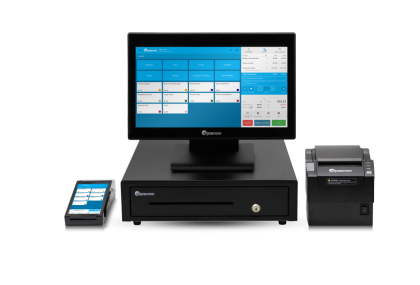How to Make Employees Feel Valued
If you're running a retail or hospitality business, you know that your employees are the backbone of your success. They're the ones who interact with customers, keep the ship running smoothly, and help drive your business forward. So, it's no surprise that making your employees feel valued is essential for keeping them happy, motivated, and engaged.
In this blog, we're going to dive into the nitty-gritty of how to make employees feel valued and show employee appreciation. We'll explore the importance of employee satisfaction and how it directly impacts the success of your business. From there, we'll go into the various factors contributing to employee morale and how you can empower your team to help them feel like they're a cut above the rest.
Because let's face it, a happy workforce is worth its weight in gold. So, let's get started! We've got a lot of ground to cover, and we're eager to help you transform your workplace into a place where your employees feel like they've hit the jackpot.
Telltale signs: how to know your team feels valued
One of the most important things as a leader is ensuring that your team members feel valued and appreciated in their work. But how do you know if this is the case? Here are some telltale signs that your team members feel valued:
- Increased productivity: When employees feel valued, they are more motivated and engaged in their work, which can lead to increased productivity. For example, providing employees with the tools and resources they need to do their jobs effectively will make them more likely to complete tasks efficiently and with high-quality results.
- Improved attitude and morale: A positive attitude and high morale can be contagious in the workplace, and when employees feel valued it can lead to a more upbeat and collaborative environment. For instance, a team member who consistently receives public praise or recognition for their hard work is likely to have a better outlook and be more motivated to contribute to the team's success.
- Increased retention: When employees feel valued, they're more likely to stay with the company for the long term. This can save significant money and resources that would otherwise be spent on recruiting and training new employees. For example, if a company offers opportunities for growth and development, team members are more likely to stay with the company and continue to improve their skills.
- Better collaboration and communication: Valued employees are more likely to open up and communicate effectively with their colleagues and superiors. For example, if employees are encouraged to share their thoughts and opinions during team meetings, it can lead to better collaboration and decision-making.
- Improved customer satisfaction: Employees are more likely to provide excellent customer service when they are happy and motivated. This, in turn, can lead to increased customer satisfaction, which can have a positive impact on a company's reputation and bottom line. For instance, if a company prioritizes employee wellbeing and provides a healthy life and work balance, team members are more likely to be in a positive state of mind and provide excellent customer service.
By paying attention to these signs, you can get a sense of whether or not your team members feel valued. And if they do, it's a clear indication that your efforts to create a positive work environment are paying off!
Factors that Contribute to Employee Morale
When it comes to employee morale, several key factors play a role. Here are a few of the big players:
1. Providing job security for your team members
Job security is a critical factor in keeping your team members happy and engaged. A survey found that 69% of employees listed job security as their top concern in the workplace. To help your team members feel secure in their positions, it's important to provide stability and security. Here are a few ways to do just that:
- Clear communication: Clear and open communication is key to job security. By keeping your team members informed about changes and updates within the company, they'll feel more in the loop and secure in their positions. Regular team meetings are a great way to communicate with your team members and provide updates on the company's progress and future plans.
- Employee retention programs: Implementing employee retention programs can also help your team members feel more secure in their positions. These programs could include things like flexible schedules, professional development opportunities, or incentives for staying with the company for a certain amount of time.
- Job security guarantees: Finally, guaranteeing job security for your team members can go a long way in helping them feel confident and secure in their positions. This could involve providing them with contracts, setting clear expectations, or offering benefits and perks that help them feel secure in their jobs.
Focusing on these areas can help create a workplace where your team members feel valued, motivated, and engaged and where job security is not a concern. A happy workforce is worth its weight in gold, so don't hesitate to make job security a priority!

The Complete Solution
Till | Cash drawer | Printer | Payment terminal
2.Valuing employees with benefits and perks
Employee benefits and perks are a crucial part of what makes a job appealing to prospective employees. In fact, a study by Glassdoor found that benefits and perks rank as the third most important factor when considering a job offer. Here are a few ways you can show your employees that you value them through benefits and perks:
- Health and wellness benefits: Health and wellness benefits, such as health insurance, gym memberships, and mental health support, show your employees that you care about their overall wellbeing. By investing in their physical and mental health, you're also investing in their ability to perform well at work.
- Benefits for remote workers: With more and more employees working remotely, it's important to offer benefits that cater to the unique needs of remote workers. This could include things like remote work allowances, virtual team-building activities, or flexible schedules.
- Celebrating work anniversaries: Celebrating work anniversaries is a great way to show your employees that you value their contributions and dedication. Whether it's a simple card or a special event, acknowledging their time and hard work with the company is a great way to make them feel appreciated and valued.
- Humanizing the workplace: Finally, creating a workplace that treats employees like human beings, not just workers, can go a long way in making them feel valued. This could involve offering flexible schedules, promoting work-life balance, or simply encouraging open and honest communication.
By offering benefits and perks that cater to the unique needs of your employees, you can show them that you value their contributions and care about their overall wellbeing. Investing in your employees will pay off in terms of a happy, motivated, and engaged workforce.
3.Encouraging a better work-life balance
In today's fast-paced world, balancing work and personal life is crucial for job satisfaction. As an employer, you can play a key role in helping your team members achieve this balance by creating a supportive work environment that prioritizes work-life balance.
- Supporting a healthy work-life balance: There are several steps you can take to support your employees with this. For example, you can offer flexible schedules, encourage taking breaks throughout the day, and promote a healthy company culture within your organization.
- Creating a supportive work environment: Creating a supportive work environment can also go a long way in making employees feel valued. Encourage employees with open communication, provide opportunities for team members to share their concerns, and listen to feedback. By creating a positive and supportive work environment, you can help your employees achieve a better balance.
- Lead by example: Leading by example is also key when it comes to promoting a better balance in your work and life. If you, as an employer, prioritize taking breaks and stepping away from work, your employees will be more likely to do the same. By showing that balance is important to you, you can help your employees feel appreciated.
Incorporating a focus on balance in your work and life into your employee appreciation strategy is a great way to show the whole team that you value their overall wellbeing and happiness. By supporting a healthy balance, you can help your employees feel more motivated, engaged, and satisfied in their work.
4.The power of a pat on the back: recognition and appreciation in the workplace
Recognition and appreciation are key components in making employees feel valued and appreciated. A survey by Achievers found that 85% of employees who received recognition in the past year felt motivated to do better in their job. This shows just how much of an impact employee recognition can have on motivation and job satisfaction.
There are many different ways to show appreciation and recognition, from simple gestures like positive feedback and public praise during meetings to more formal recognition programs. Regardless of the method, it's important to make sure that employees feel acknowledged and appreciated for the hard work they put in.
Public praise during meetings is a great way to give an employee a shoutout in front of their colleagues. This not only makes the recipient feel good, but it also sets an example for other team members, encouraging them to work hard and strive for recognition.
Ultimately, recognizing and employee appreciation is about valuing them as human beings and acknowledging their contributions to the company. Whether it's through public praise or employee recognition programs, making employees feel valued and appreciated is essential for creating a positive work environment and improving job satisfaction.
5.Opportunities for development
Providing opportunities for growth and development is a key aspect of valuing your employees and empowering them to succeed. Whether it's through training programs, mentorship opportunities, or other resources, employees want to feel like they're making progress in their careers and developing their skills.
As a chief executive officer or leader, it's your responsibility to provide the resources and support necessary to help a team member grow. This might mean investing in training programs, assigning mentors, or encouraging employees to take on new projects and challenges. Whatever the approach, the goal should be to help employees feel confident and capable in their roles, and to create a supportive work environment where growth and development are encouraged.
Valuing your employees and empowering them to succeed is a win-win situation. By providing opportunities for growth and development, you'll not only improve employee morale, but you'll also create a more productive, innovative, and successful team. So, take the time to invest in a team member and watch your business thrive!
How can a POS system help?
In today's fast-paced business environment, it's essential to have the right tools and technology to help you run your business smoothly and efficiently. One such tool that can make a big impact is a POS system. Whether you're running a retail or hospitality business, a good POS system can help you in many ways.
For retail businesses, a retail POS system can streamline your checkout process, improve your inventory management, and provide valuable insights into your sales and customer behavior. With features like payment processing services, you can quickly and securely process payments, making it easier for your customers to do business with you.
In the hospitality industry, a hospitality point of sale can help you manage your table reservations, take orders, and improve your payment processing services with ease. With a well-designed POS system, your waitstaff can spend less time fumbling with paper menus and receipts and more time delivering a great experience to your customers.
Wrapping it Up with a Bow-Wow
In conclusion, keeping your employees motivated, engaged, and valued is critical to the success of your business. Many factors contribute to employee morale, from job security and benefits to recognition and opportunities for growth and development.
By taking the time to understand what's important to your employees and implementing strategies that empower your team, you can create a workplace culture that encourages and supports your employees. When employees feel valued and appreciated, they're more likely to be engaged, motivated, and productive.
As a CEO or manager, it's important to remember that your employees are the backbone of your business. Investing in your team's wellbeing and success is not just the right thing to do. It's also the smart thing to do. Empowered employees are more likely to stay with your company, deliver better results, and help your business grow.
So why not start today? Take a few moments to consider what your employees need to feel valued and appreciated, and put some strategies in place to support them. Whether it's public recognition, team-building activities, or opportunities for growth and development, there are many ways to show your employees that they're valued and appreciated.
In the end, it all comes down to valuing your employees as the human beings they are. When you consciously prioritize your team's wellbeing and success, you'll create a workplace culture that benefits everyone. Your employees will be happier, and your business will thrive as a result.



